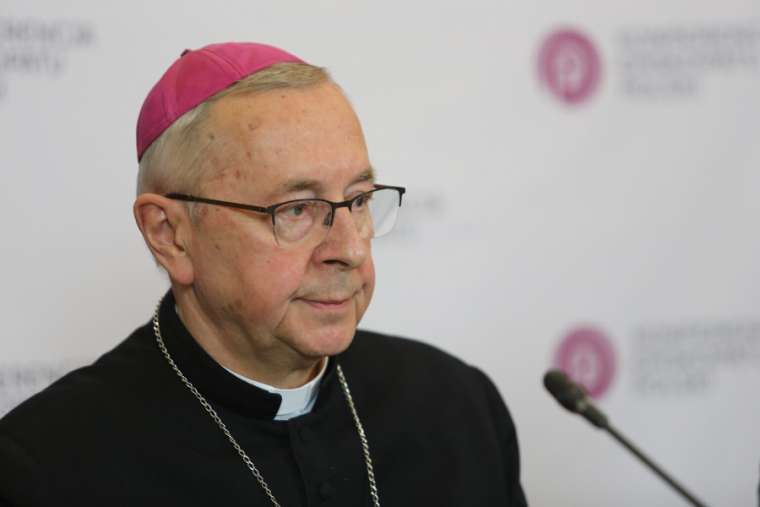Archbishop Stanisław Gądecki, president of the Polish bishops’ conference, pictured in Warsaw Feb. 12, 2020. Credit: episkopat.pl.
St. John Paul II’s “highest priority” was combating clerical abuse and protecting young people, a Catholic archbishop said Monday in response to what he called “unprecedented attacks” on the Polish pope.
In a statement, Archbishop Stanisław Gądecki, president of the Polish bishops’ conference, defended John Paul II’s legacy in the wake of the McCarrick Report, which unleashed criticism of the pope who appointed McCarrick as archbishop of Washington in 2000 and made him a cardinal a year later.
“On the 100th anniversary of the birth of St. John Paul II, we are witnessing unprecedented attacks on his person. The pretext is the alleged failure of the Pope to disclose and punish the clergy — perpetrators of sexual abuse against minors,” Gądecki said.
“People who thoroughly research the history of the pontificate of the Holy Father know very well that the issues of protecting children and youth and counteracting any abuses by the clergy were the Holy Father’s highest priority.”
“It was he who saw the future of the Church in the young, and therefore he was the first to introduce the Church’s legal regulations to protect the weakest, and thus initiated the process of detecting sexual crimes and punishing clergymen who perpetrate them.”
The archbishop of Poznań reiterated points that he had made in a statement days after the publication of the McCarrick Report, arguing that the disgraced ex-cardinal “cynically deceived” the pope and that American bishops had passed incomplete information about McCarrick to the Vatican.
He thanked Pope Francis for publishing the report and for his comment in the document that “John Paul II was a man so morally strict, of such moral rectitude, that he would never have permitted a rotten candidacy to move forward.”
Gądecki said that the Church in Poland’s response to the report was summed up by Pope Francis’ comment at his general audience the day after its publication.
“Yesterday, the report on the sad case of former cardinal Theodore McCarrick was published. I renew my closeness to the victims of sexual abuse and the Church’s commitment to eradicate this evil,” the pope said 11 November.
Last month, a Polish Catholic university also rejected claims that St. John Paul II had failed to combat clerical abuse.
The rector’s college of the John Paul II Catholic University of Lublin said 14 November that the assertions had no factual basis and lamented the “fallacious accusations, calumnies, and slander directed recently against our patron saint.”
In his statement, Gądecki chronicled John Paul II’s actions against clerical abuse.
He cited the pope’s 1993 letter to U.S. bishops, in which he recalled Jesus’ words that “for him who gives scandal it would be better to have a great millstone hung around his neck and to be drowned in the depths of the sea.”
The archbishop also said that John Paul II issued a special indult for the U.S. Church in 1994 and two years later for the Irish Church, emphasizing that there would be no tolerance for sexual abuse.
He noted that in 2002 the Polish pope urged U.S. cardinals to promptly address the crime of abuse, saying: “People need to know that there is no place in the priesthood and religious life for those who would harm the young.”
In addition, he referred to John Paul II’s 2001 motu proprio “Sacramentorum sanctitatis tutela,” requiring clerical abuse cases worldwide to be reported to Vatican Congregation for the Doctrine of the Faith.
“It must be clearly stated that the present state of awareness on these issues and the subsequent guidelines and instructions for proceeding largely result from the decisions and actions of St. John Paul II,” said Gądecki, the vice-president of the Council of the Bishops’ Conferences of Europe (CCEE).
“These decisions inspired further steps to protect children and young people and help those who have been harmed in the Church.”
Source: CNA

